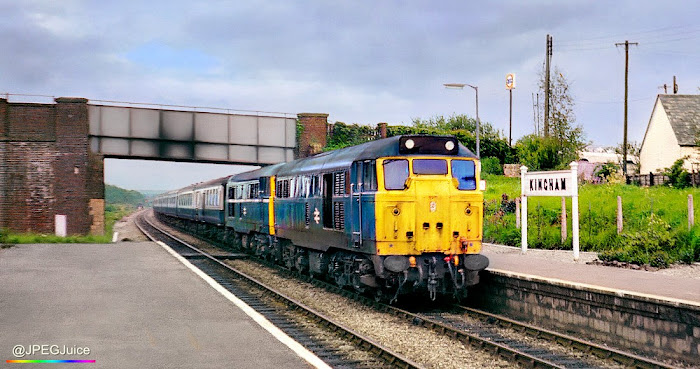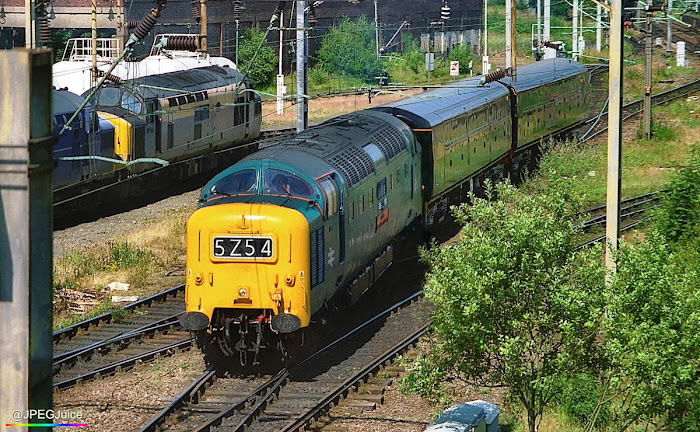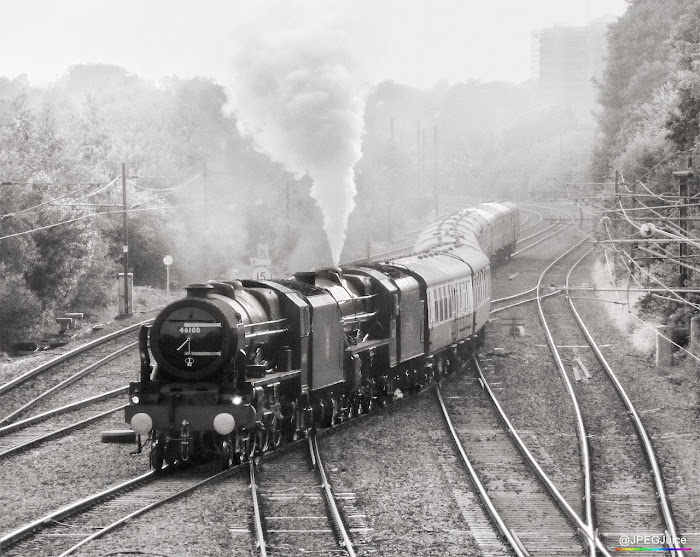"I will give you three bona fide Travellers Fare sandwiches, all made within the past twenty-eight days and still recognisably triangular in shape..."

What goes up, must come down. 31419 and 31413 provide unusual power for the 16:28 Sundays only Paddington - Hereford, on 24th May 1981.
Gen. Advance information relating, in the context of this article, to specific railway vehicles on specific train services. In particular, anything unexpected.
Even though we now live in an age of information overload, it's still not a given that we'll be able to find out what's going where until it's been and gone. But railway gen is a lot more accessible in 2021 than it was in 1981, and sweeping changes to the way the railway operates have meant that most of the chaseables now run outside of the working timetable.

Early email list groups gained advance warning of this highly hellfire one-off Marcroft to Old Oak Common stock move on Saturday 10th July 1999. But here at Bescot Stadium, 55019's appearance took the whole station by surprise. Today, the train's arrival would be counted down in milliseconds.
So we can usually identify the most noteworthy trains solely by their status within live online listings. RealTimeTrains even highlights the likely candidates on the page. Live listing sites of this type have almost become gen "convenience stores". And if the trains or locomotives are not identified by number in the live listings' details, we can query a combination of other resources in a bid to grab the relevant info. Normally, if it's worth knowing, someone, somewhere, will be shouting about it. It wasn't always like this...
EARLY GEN DISTRIBUTION SYSTEMS

The Bristol Forty charter of 1st July 2021 was live-listed online with full details of its motive power and location at any given time. One of the consequences of live gen being so readily available today is that standing space at certain vantage points has become considerably harder to find than the information. This is the steam-hauled return at Kings Norton.
Originally, of course, railway gen was disseminated through carrier pigeon. Pigeon would arrive, note would be unfolded and read...
From Ed
Gen Guru
“
Update. 9am Rainhill to Rainhill - Rocket as diagrammed. Sans Pareil's thrash deemed danger to public life so 10am now cancelled. 11am may run but is booked a horse.
“
Update. 9am Rainhill to Rainhill - Rocket as diagrammed. Sans Pareil's thrash deemed danger to public life so 10am now cancelled. 11am may run but is booked a horse.
The recipient could then reply...
From Ned
Rocket Basher
“
Clarification reqd, Sir. Is 'horse' a new type of loco, or are we talking horse as per current dictionary definition: Four-legged herbivore, eats hay and sugar lumps & was demonstrably incapable of reassembling Humpty Dumpty?
“
Clarification reqd, Sir. Is 'horse' a new type of loco, or are we talking horse as per current dictionary definition: Four-legged herbivore, eats hay and sugar lumps & was demonstrably incapable of reassembling Humpty Dumpty?
From Ed
Gen Guru
“
Both.
“
Both.
From Ned
Rocket Basher
“
Any gen on which horse it is?...
“
Any gen on which horse it is?...
IN THE BRITISH RAIL BLUE ERA

Class 40 No. 40069 at Cleethorpes, in 1981.
Fast-forward a century and a half, and you arrive amid the era of British Rail. By 1980, most gen was leaked into the “nedosphere” by enthusiasts with access to the BR TOPS computer system. Or alternatively, was just predicted according to diagram. That is, what goes up, must come down. If Old Oak Common sends a pair of 31s to Worcester, the assumption is that Worcester will send the boneshakin' wretches back at the very earliest opportunity. Once someone has the information, it has a limited amount of time to spread by word of mouth.
Word of mouth could spread information extremely quickly. From region to region by phone (known as a “tip-off”), and rapidly along the platforms, into the waiting rooms and buffets, and back out again. At hotspots, on summer Saturdays, gen could even be orated evangelist-stylee to a platform gathering. No joke.

Class 45 No. 45115 at Northfield on the normally Class 47-hauled 09:50 Edinburgh - Plymouth, 1981.
In the 'eighties, railway tip-offs were often an almost movie-style scenario. Men who were known only by their initials or town of residence, flinging open the heavy door of a call box, frantically prodding at a rotary dial, spinning a ten pence piece into the slot, and then yelling headcodes and loco numbers down the receiver above the street cacophony of black cab motors and parping horns. Why bother to tip someone off? Why, for the hard currency of course. Oh yes, this was not some kind of favour. It was a deal...
From Ed
God of Hellfire
“
Look, I know something, and it's big. And when I say big, I mean you're gonna need to turn your binoculars back to front. But this is gonna cost you...
“
Look, I know something, and it's big. And when I say big, I mean you're gonna need to turn your binoculars back to front. But this is gonna cost you...
From Ned
Main Basher
“
I will give you three bona fide Travellers Fare sandwiches, all made within the past twenty-eight days and still recognisably triangular in shape. No sardines...
“
I will give you three bona fide Travellers Fare sandwiches, all made within the past twenty-eight days and still recognisably triangular in shape. No sardines...
From Ed
God of Hellfire
“
It's bigger than that.
“
It's bigger than that.
From Ned
Main Basher
“
So, er... Three fully-triangular, sardine-free sandwiches, plus half a BRAND NEW baked potato complete with 32 individual sachets of BR butter from an HST buffet. Deal?
“
So, er... Three fully-triangular, sardine-free sandwiches, plus half a BRAND NEW baked potato complete with 32 individual sachets of BR butter from an HST buffet. Deal?
From Ed
God of Hellfire
“
No deal. Five BR pies on Pullman-branded paper plates and two Casey Jones milkshakes. No haggling. But I will also have all the butter off you if it's got a coat of arms on the wrappers.
“
No deal. Five BR pies on Pullman-branded paper plates and two Casey Jones milkshakes. No haggling. But I will also have all the butter off you if it's got a coat of arms on the wrappers.
So the initial tip-off could take some palm-greasing - or palm-gristle-ing as the above example would perhaps more accurately be described. But once word was out, tip-offs were nearly impossible to contain, and they often spread purely based on “sheep factor”. There were only so many people with Locosheds, Adidas bags and half-eaten “gristle pies” that could pile out of a New Street waiting room and onto a Coventry-bound EMU, before it became obvious that the Southern Region had let another Class 33 go walkies. People just followed the herd.
ELECTRONIC DISSEMINATION & THE MODERN ERA

Email list-based gen systems became available in the mid 1990s, even before the Blackberry device simplified mobile email distribution. In fact, before SMS to email translation was available or understood by consumers, some enthusiasts were using laptop computers as a means to receive and update gen on the go.
Mobile phones were tentatively used in the second half of the 1990s, but initially, mobile networks in the UK only allowed customers to send messages to other users on the same network, limiting the usefulness of the service. Gen distribution had, however, become a lot more resilient by the latter '90s - simply because communication was so much easier by then. People could talk into mobile phones (well, shout, obviously) even if they couldn't send or receive emails on them. And that meant enthusiasts were communicating their live observations even when the railway itself was attempting to conceal, disrupt or misdirect the flow of gen.
In the video Traction '97 Part 2, narrator David Maxey said when discussing the 'Deltic's return to main line service operation...
"This top secret test run for Virgin, turned out to be anything but, despite strenuous efforts to confuse the grapevine."
D9000 had worked the 1M20 from Paddington to Birmingham, and footage of the Paddington departure is followed in the video by an iconic camcording of the 'Deltic' racing back south through Adderley Park on the return 1V96. The commentary?...
"By now, word had spread like wildfire, and the train was wedged to the roof, as the cranks clamoured for haulage many thought impossible..."
It's fair to say that by 1997, the railway could no longer keep any significant motive power movement secret.

A nice bit of Royal action from 47799 in May 1999. The rings of gen distribution were set to explode in the course of the next five years.
In 1999, when the UK ceased restricting mobile text messages to the home network only, the concept of mobile gen transfer really kicked into overdrive. Wayback Machine has preserved the moment in latter 1999 when the email list format of Mobile Rail Gen really began to take off as a concept, and Tony Underwood explained the basics to visitors referred to the site by word of mouth or magazine mentions. This is still effectively pre-Blackberry...
Early Rail-Gen Intro on Internet Archive
Within five years, virtually everyone you met at the lineside had a Blackberry in pocket and an advance schedule of the whole day's highlights. Gladly, no longer did we need to pay for gen in measures of BR pie or individually-wrapped butter. And we all lived happily ever after.